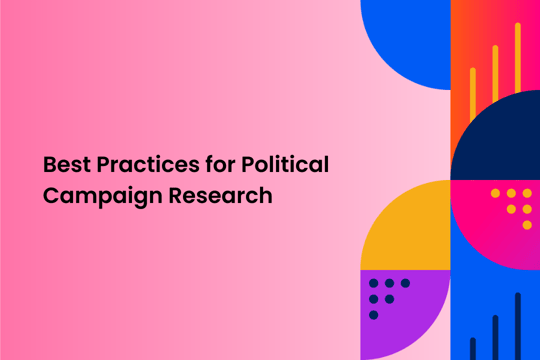The 6 Best Practices for Political Campaign Research

Whether you are a campaign team, PAC, or other organization whose success depends on reliable political insights, then you need to think hard about how you conduct opinion polling and political surveys. Keep reading to uncover the 6 best practices for effective political research.
Online polls are the way to go
In today’s world, the decrease in landlines and the surge in cell phone usage and digital adoption highlight the need for online polling research. Relying solely on manual “traditional” methods (in-person or telephone) is time-consuming, expensive, and inherently limited in reach. Accessing audiences online is necessary to reach the general population at scale, now a key component of any political research.
Avoid ambiguity in data methodology
An inaccurate political poll can be worse than no poll at all. Although there is always a margin for error in any survey, choosing a credible audience source is a critical step to reduce the potential for inaccuracies.
When sourcing polling participants it’s critical to understand the company’s relationship with the consumers who are providing their opinions. Is the audience directly owned by them or is it accessed through the marketplace? Does the provider work directly with their audience or do they rely on aggregate partners for recruitment and management? Get as close to the public as possible, and remove any unnecessary middlemen.
Once the source of the audience is confirmed, confirm how the data is collected. Quality results come when a consumer willingly opts-in to share their data and knows what it’s being used for. With the changing consumer privacy laws, respecting consumer choice helps build trustworthy relationships and enforces a gold standard in research practices, even beyond polling.
Finally, working with a company that prioritizes data quality is key. Polling results from bots and fraudsters can be incredibly misleading and lead to an inaccurate measure of public opinion. Proprietary audience sources have more levers to pull when it comes to fraud detection and removal, which could mean the difference between your poll being right or wrong.
Representative audience
Demographic makeup matters when you are assessing potential sources of audience for political insights. Polling an audience that is heavily skewed towards a certain demographic increases the risk of having bias in your results.
To prevent this, you need an audience that is representative of the population you are attempting to measure whether that be at the local, state, or national level. Identifying an audience source that offers scale and diversity in demographic characteristics like race, age, and location, allows you to weight and calibrate your results as needed.
Target the right constituents
Audience targeting needs will vary depending on the objective of your political study. However, it is best to work with a deeply profiled audience so you can get more specific with your targeting, if need be.
For example, DISQO audience members are screened and profiled based on a wide range of demographics and personal attributes including voter status and political association. This enables you to run broad national polls with registered voters country-wide as well as more targeted studies based on someone’s political party or geographical location (at the state, district, or local level).
However, there could be instances when profiles and screeners alone are not enough to target the exact audience you need. Instead, having the ability to target audiences for your study based on digital behaviors can give you a competitive advantage. For example, our behavioral targeting capabilities can help political researchers learn more about people who consumed certain content online or made specific searches related to their political beliefs.
Leverage the right platform
Use the right method to get your insights, based on budget and the scope of research you’re conducting. For simple gen pop political studies, it might make sense to leverage automation or a self-service option whereas more complex longitudinal studies with a more specific target audience might require the guided support of a professional services team.
To accommodate the largest range of political studies and maximize efficiency, look for flexibility in options and different ways of working with an audience platform.
Race to results
A political poll serves as a snapshot of a population’s political values and opinions at a given point in time but opinions can change quickly and dramatically. It’s not only important to ask people the right questions, but to ask them often.
To keep up with the day-to-day pace of change and the fluidity of political opinions, political researchers must find ways to swiftly collect opinions from a quality audience. Remain competitive in the space and maximize the value of your insights efforts by using a research platform that guarantees timely results.
Want to learn more? Explore DISQO's solution for political researchers here.

Subscribe now!
Get our new reports, case studies, podcasts, articles and events
